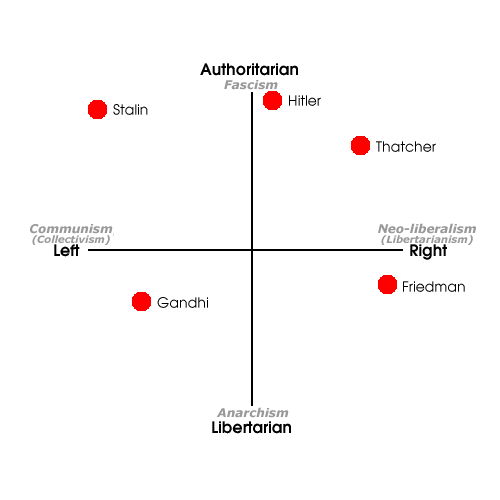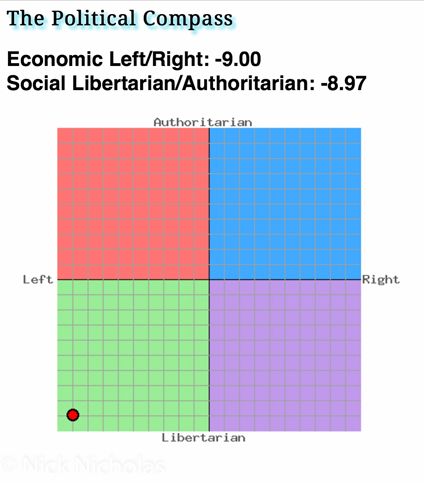
Where I Stand
![]()
My politics are unapologetically and outspokenly progressive. The US was founded on progressive ideas, and to be a conservative is to be both un-Christian and un-American.
A website, Political Compass, has a short 20-question survey that purports to show one's political and economic predilections. The results position one on a graph with one axis ranging between a collectivist economy and a completely free-market one, and a second axis ranging between a totalitarian form of government and a libertarian one. The chart below illustrates where famous historical characters would have appeared on the Political Compass chart:

My own "political compass" is shown below:

In sum, I am very strongly anti-authoritarian AND I am very strongly inclined towards collectivist economic systems. I might appear to be an extremist, and I suppose I may be to some degree. However, I reached this position after many years of careful thought, close observation, and extensive reading, contemplation, deliberation and dialogue. I prefer to think that I have reached this point because I have thought through the issues so very thoroughly. I follow a line of thinking to its ultimate conclusion in order to make a decision about whether or not I can incorporate it into my own belief system. The authors I credit most for helping me reach this enlightenment are Pierre-Joseph Proudhon (see also this essay) and Mikhail Bakunin. Many other possible alternatives have fallen by the wayside because, when examined deeply, they lead to unacceptable conclusions.
The political philosophy that best accommodates this perspective is anarcho-syndicalism. Its first premise is the primacy of the individual; anarcho-syndicalism is hostile to all coercive political and economic systems. At the same time, however, anarcho-syndicalism recognizes that humans are social creatures, and therefore individuals are best fulfilled when they organize with others for their mutual benefit. The governing rule in such associations is consensus: reaching an agreement which all parties agree not to oppose the agreed-upon decision. In this manner, the autonomy of the free individuals are retained at the same time they are able to flourish within a community.
Unlike most organizational structures which are hierarchical and power flows from the top to the lower levels of staff and workers, in anarcho-syndicalism the power base comes from the workers who then select those to represent their interests as they manage company operations. Anarcho-syndicalism is no pie-in-the-sky political ideology with no practical application. It was successfully applied in several factories and farming operations in Spain in the mid-1930s until the fascists led by Francisco Franco defeated the rebel forces in the Spanish Civil War in 1936.
America's greatest intellectual, Noam Chomsky, describes himself as an anarcho-syndicalist. He has written an excellent essay further explaining what anarcho-syndicalism is and is not.
One of my favorite books is Marge Piercy's Woman on the Edge of Time (available in print from Amazon or free in electronic format). In this book, Piercy describes, although without ever using these terms, an anarcho-syndicalist utopia. I have read a great amount of utopian literature, and this is the only utopia I've read about in which I actually would like to live.
Another crucial point Piercy makes in this text is that all of us are "women on the edge of time," that every day, every decision we make, every action we take, determines the kind of future we will bring into being. I try to act so that the future I would like to see comes to pass.
![]()
| Previous |
![]()
Please use the links below to reach other areas of this site:
Last revised: June 5, 2015.

| Contact Me | About Me |